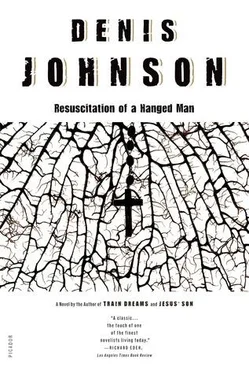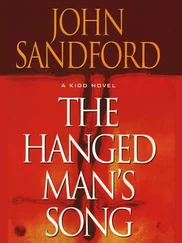On the second floor English found empty offices, their doors ajar, and one with TWINBROOK written across its wood with an indelible pen. The door was locked.
The confusion of wrong turns that had marked his route here now overwhelmed his mind — for some reason English hadn’t thought of having to get in. He was no burglar. Yet certainly he lacked a key.
He’d been turning around and going back too much today, but he had to go back to his car for a screwdriver and climb with considerable self-consciousness back up the stairs to confront Twinbrook’s door. He knew nothing of locks, but the door was flimsy and gave sideways easily when he pried between door and frame with the screwdriver. In the pauses of the typewriter upstairs, he held his breath. He might have pried the bolt from its housing in one try, but it took him a minute to work up that much boldness. It made a noise, just a squawk, coming open; he closed it silently behind him. The light switch did nothing, but soon he found a light, an overhead fluorescent that must have been provided by the tenant. Its cord hung down before the desk and lay across the floor in loops, a thick red extension cord that made English think of carpenters at work.
When he let loose the light chain, he located himself in a scattering of white papers. Stacks of books and typesheets covered the floor, spilling from Gerald Twinbrook’s desk and chair: old wooden things from the era of steam heat and big iron radiators.
Sands had said it would be here, in this room, under a book; penciled in the margin of a letter, doodled absently on a pad — a name, an address, a phone number: the answer. And English believed him. It only needed finding.
He judged it was around noon. No one had been here in months, and they wouldn’t be coming back today. He had all the time he could use. Then why did he feel rushed? In a daze of reluctance he walked in small circles around the office, skimming the surface of all this data, glancing at the typesheets and file folders on the desk, reading the title of the top book on a pile of books beside the chair, failing to find significance or purpose in two dotted maps and a ragged list of names taped to the wall behind the desk.
The light hummed overhead. It made him nervous. He turned it off.
He sat in the wooden chair before the desk and lit a cigarette. There wasn’t any ashtray around, however, and in fact not even a wastepaper basket — crumpled white sheets of typing paper, which English understood weakly he’d have to uncrumple and peruse, filled a corner like a drift of snowballs.
Catching the handle of a drawer with the toe of his shoe, he opened a space of visibility into which he peeked as he might have down a shaft of darkness, or under a shroud: more paper, more folders, more books, all stacked in a pile that stair-stepped into collapse at the back of the drawer, which he closed as soon as he’d fully opened it.
In the other double drawer he found Twinbrook’s typewriter, an antique Royal table model that didn’t need hiding to protect it from theft.
He checked the heating conduit along the office’s baseboard and found it cold; but the room was sunny, and he took off his jacket.
On the floor beneath the window was Twinbrook’s white telephone. English picked up the receiver, listened to the dial tone, and hung it up again. For a while he looked out the window at the trees beneath him, stubby evergreens addressed, almost dwarfed, by the great blade of a Caterpillar tractor beyond them, a looming brown shadow backed by the sun in a cleared lot of yellow dirt. High above the earth he’d scraped clean, the tractor’s operator sat in the open cab, drinking from a thermos and looking at the trees in front of him.
English stood still while the typist in the upper office walked across the ceiling, shut the door overhead, and descended the stairs. When the door downstairs banged and the person was gone, English looked around the room at the mounds of papers and zigzagging columns of books with real irritation, as if the typist had intentionally left him here to do all this reading and thinking without anybody’s comfort.
Now he stood behind the desk and examined Twinbrook’s maps — two large ones, of New England and of metropolitan Boston, stuck full of red-, blue-, and yellow-headed pins and annotated with symbols he couldn’t make out.
Suddenly English turned, gripped a stack of books and papers on the desk, arranged them before himself like a meal, and sat down.
At page 173 Twinbrook had left off reading a book by Stephen King, and marked his place with a shred of typing paper. He’d spilled coffee all over one called Life After Life by a man named Moody; the leaves were wrinkled and suddenly antique. A fresh-looking paperback copy of Tarantula by Bob Dylan appeared never to have been opened. There was a schedule of buses passing through Marshfield; nothing was marked or underlined. But signs and marks and annotations crowded the pages of Encyclopedia of Card Tricks by somebody named Hugard and another called The Greatest Power on Earth, which appeared to be about atomic weapons. There were in-house phone directories for several corporations, including IBM and AT&T, but none of the names in these directories was marked or underscored. It occurred to English now to shake out the copy of Tarantula in the hope a slip of paper, something bearing a name or a number, might float from among its pages.
At this point a plan for coping with the major part of this mess — the part that weighed the most anyway — came to him, and he went around the room stooped over, collecting stacks of books and leaving any other kind of paper to lie where it fell. He piled the desk with volumes and began shaking out the pages — a paperback Tibetan Book of the Dead, a dictionary, novels by Georges Simenon and Graham Greene, three James Bond books, a fat one called The Fourth Way, a Bible, another Bible, and then he ignored the tides — collecting every bookmark and looking at it.
On one he found four telephone numbers with out-of-state area codes. He pocketed it. Every other bookmark was a blank shred of typing paper.
Outside, the Caterpillar started up with a gigantic clearing of its throat, and English went to the window to watch it flounder, roaring, in the storm of dust it had raised. As the operator measured a sapling with its blade, it seemed to recover its mind; as it came against the tree, its bawling became steady and thoughtful for a few seconds, and then outraged as the rollers shrieked across the treads and the blade unstrung the plant from the ground. It was sweet to hear the noise.
Coming in through the glass window, the sun’s mild warmth burned the air. English pulled his sweater over his head and sat down at the desk. For a moment he considered these questions: Twinbrook, are you missing or are you hiding? Have you left a clue or have you covered your tracks? He was chain-smoking, mashing his cigarettes out on the floor. Do you mind, Twinbrook? Come in and tell me to stop.
He began on the sheets of paper — hundreds, maybe thousands of them. Many were ballpoint sketches and doodles, some were handwritten lists of names, all of them brand names or the names of political groups or business corporations.
He found two carbon copies of such a list, neatly typed. The listed corporations included IBM, AT&T, all the big outfits English had ever heard of. There were about three dozen of them. The Daughters of the American Revolution, the John Birch Society, the Ku Klux Klan. There was a circle around “Truth Infantry.”
English stood up, greatly excited. Circled! But had Twinbrook circled it, or had he, English? He was holding a pen in his hand. He put the page on the desk and drew a circle on it. The ink looked identical.
Читать дальше












